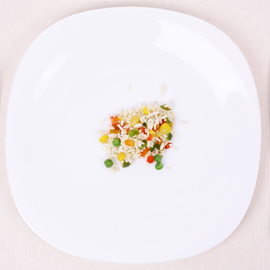 When it comes to avoiding acid reflux and heartburn, reducing the amount you eat at a meal can be as important as avoiding specific trigger foods. If you suffer from gastroesophageal reflux disease (GERD), eating smaller meals more frequently can be a valuable habit for controlling your symptoms and avoiding discomfort.
When it comes to avoiding acid reflux and heartburn, reducing the amount you eat at a meal can be as important as avoiding specific trigger foods. If you suffer from gastroesophageal reflux disease (GERD), eating smaller meals more frequently can be a valuable habit for controlling your symptoms and avoiding discomfort.
Why Does Eating Large Meals Cause Acid Reflux?
Eating a large amount of food causes the stomach to expand. As the stomach expands, the muscular valve at the top of the stomach called the lower esophageal sphincter (LES) is less likely to close properly.
The LES is responsible for preventing stomach contents from rising into the esophagus. The more we eat, the more the stomach stretches and the LES relaxes, and the higher our risk of experiencing acid reflux.
Eating large meals often also means we’re eating more than we need. Because GERD and obesity are strongly linked, overeating can also lead to weight gain that results in more problems with acid reflux and heartburn.
Planning Smaller Meals
Instead of eating three large meals, it may help to eat five or six smaller meals throughout the day. This will give your stomach time to empty after you eat, minimizing the pressure on the LES and reducing the risk of acid reflux.
Each individual is healthiest with a different diet. The ideal amount to eat will depend largely on factors like height, age, sex, activity level and body size. It is especially important to be careful of the amount you eat if you are trying to lose weight, and speaking to your doctor or a nutritionist can help you determine how much and what to eat throughout the day.
Here is an example of how someone with GERD might break up his or her diet into a series of smaller meals:
Breakfast
- One small bowl of high-fiber cereal with skim or soy milk
- One cup of nonfat Greek yogurt
Snack
- One small banana or apple
Lunch
- One small turkey sandwich with lettuce and cucumber on whole grain bread
- One cup of carrots and celery sticks and low-fat ranch dressing
Snack
- One-half cup of grapes
- One serving of whole grain crackers with one teaspoon of peanut butter
Dinner
- One small grilled chicken breast
- One cup of brown rice
- One and a half cups of green beans
If you space your meals out in this way, be careful to not eat dinner too late. Eating within four hours of bedtime may lead to nighttime heartburn and acid reflux.
Splitting your diet into smaller, more frequent meals can be a positive step towards preventing GERD symptoms. Just remember to keep your own dietary needs and personal acid reflux triggers in mind.

Leave a Reply